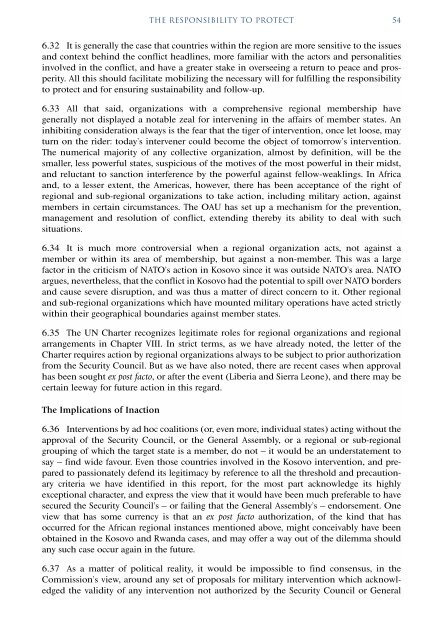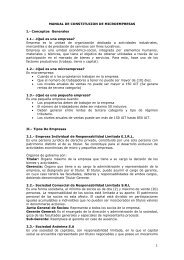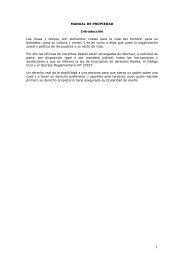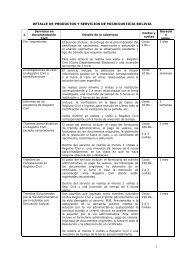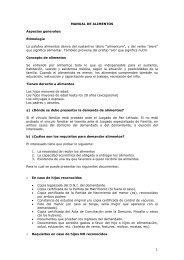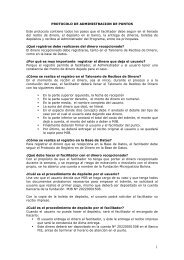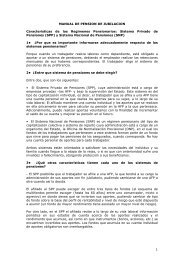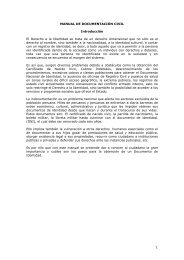ICISS report - International Coalition for the Responsibility to Protect
ICISS report - International Coalition for the Responsibility to Protect
ICISS report - International Coalition for the Responsibility to Protect
You also want an ePaper? Increase the reach of your titles
YUMPU automatically turns print PDFs into web optimized ePapers that Google loves.
The <strong>Responsibility</strong> <strong>to</strong> <strong>Protect</strong> 54<br />
6.32 It is generally <strong>the</strong> case that countries within <strong>the</strong> region are more sensitive <strong>to</strong> <strong>the</strong> issues<br />
and context behind <strong>the</strong> conflict headlines, more familiar with <strong>the</strong> ac<strong>to</strong>rs and personalities<br />
involved in <strong>the</strong> conflict, and have a greater stake in overseeing a return <strong>to</strong> peace and prosperity.<br />
All this should facilitate mobilizing <strong>the</strong> necessary will <strong>for</strong> fulfilling <strong>the</strong> responsibility<br />
<strong>to</strong> protect and <strong>for</strong> ensuring sustainability and follow-up.<br />
6.33 All that said, organizations with a comprehensive regional membership have<br />
generally not displayed a notable zeal <strong>for</strong> intervening in <strong>the</strong> affairs of member states. An<br />
inhibiting consideration always is <strong>the</strong> fear that <strong>the</strong> tiger of intervention, once let loose, may<br />
turn on <strong>the</strong> rider: <strong>to</strong>day’s intervener could become <strong>the</strong> object of <strong>to</strong>morrow’s intervention.<br />
The numerical majority of any collective organization, almost by definition, will be <strong>the</strong><br />
smaller, less powerful states, suspicious of <strong>the</strong> motives of <strong>the</strong> most powerful in <strong>the</strong>ir midst,<br />
and reluctant <strong>to</strong> sanction interference by <strong>the</strong> powerful against fellow-weaklings. In Africa<br />
and, <strong>to</strong> a lesser extent, <strong>the</strong> Americas, however, <strong>the</strong>re has been acceptance of <strong>the</strong> right of<br />
regional and sub-regional organizations <strong>to</strong> take action, including military action, against<br />
members in certain circumstances. The OAU has set up a mechanism <strong>for</strong> <strong>the</strong> prevention,<br />
management and resolution of conflict, extending <strong>the</strong>reby its ability <strong>to</strong> deal with such<br />
situations.<br />
6.34 It is much more controversial when a regional organization acts, not against a<br />
member or within its area of membership, but against a non-member. This was a large<br />
fac<strong>to</strong>r in <strong>the</strong> criticism of NATO’s action in Kosovo since it was outside NATO’s area. NATO<br />
argues, never<strong>the</strong>less, that <strong>the</strong> conflict in Kosovo had <strong>the</strong> potential <strong>to</strong> spill over NATO borders<br />
and cause severe disruption, and was thus a matter of direct concern <strong>to</strong> it. O<strong>the</strong>r regional<br />
and sub-regional organizations which have mounted military operations have acted strictly<br />
within <strong>the</strong>ir geographical boundaries against member states.<br />
6.35 The UN Charter recognizes legitimate roles <strong>for</strong> regional organizations and regional<br />
arrangements in Chapter VIII. In strict terms, as we have already noted, <strong>the</strong> letter of <strong>the</strong><br />
Charter requires action by regional organizations always <strong>to</strong> be subject <strong>to</strong> prior authorization<br />
from <strong>the</strong> Security Council. But as we have also noted, <strong>the</strong>re are recent cases when approval<br />
has been sought ex post fac<strong>to</strong>, or after <strong>the</strong> event (Liberia and Sierra Leone), and <strong>the</strong>re may be<br />
certain leeway <strong>for</strong> future action in this regard.<br />
The Implications of Inaction<br />
6.36 Interventions by ad hoc coalitions (or, even more, individual states) acting without <strong>the</strong><br />
approval of <strong>the</strong> Security Council, or <strong>the</strong> General Assembly, or a regional or sub-regional<br />
grouping of which <strong>the</strong> target state is a member, do not – it would be an understatement <strong>to</strong><br />
say – find wide favour. Even those countries involved in <strong>the</strong> Kosovo intervention, and prepared<br />
<strong>to</strong> passionately defend its legitimacy by reference <strong>to</strong> all <strong>the</strong> threshold and precautionary<br />
criteria we have identified in this <strong>report</strong>, <strong>for</strong> <strong>the</strong> most part acknowledge its highly<br />
exceptional character, and express <strong>the</strong> view that it would have been much preferable <strong>to</strong> have<br />
secured <strong>the</strong> Security Council’s – or failing that <strong>the</strong> General Assembly’s – endorsement. One<br />
view that has some currency is that an ex post fac<strong>to</strong> authorization, of <strong>the</strong> kind that has<br />
occurred <strong>for</strong> <strong>the</strong> African regional instances mentioned above, might conceivably have been<br />
obtained in <strong>the</strong> Kosovo and Rwanda cases, and may offer a way out of <strong>the</strong> dilemma should<br />
any such case occur again in <strong>the</strong> future.<br />
6.37 As a matter of political reality, it would be impossible <strong>to</strong> find consensus, in <strong>the</strong><br />
Commission’s view, around any set of proposals <strong>for</strong> military intervention which acknowledged<br />
<strong>the</strong> validity of any intervention not authorized by <strong>the</strong> Security Council or General


